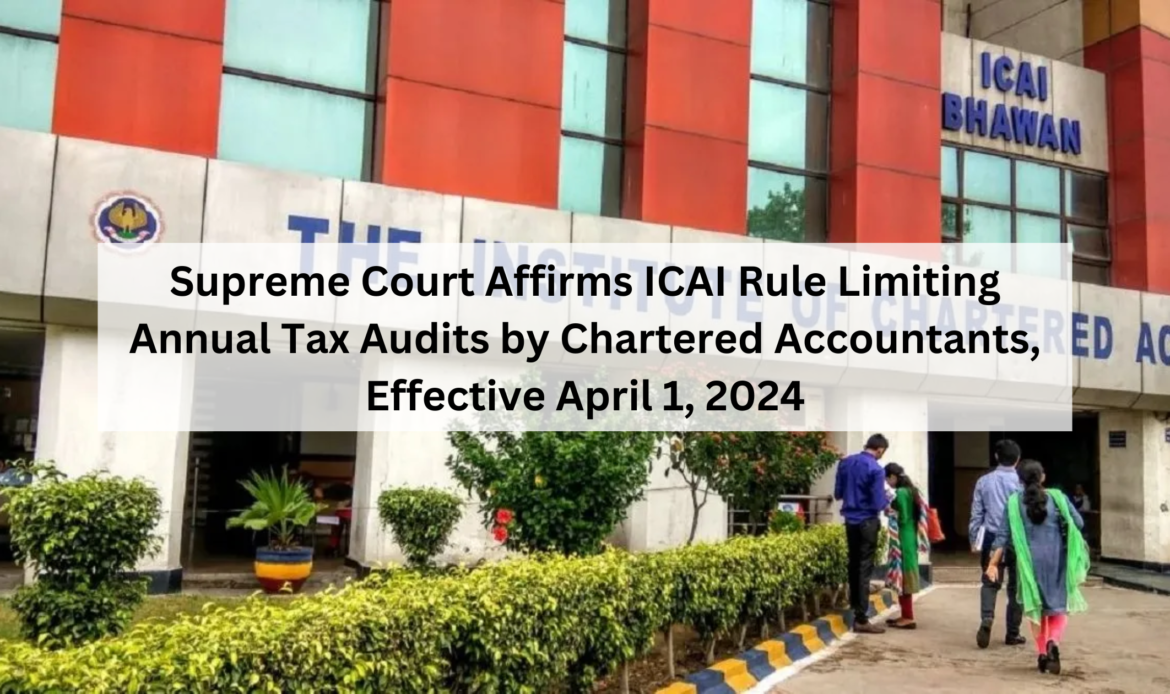On May 17, the Supreme Court upheld a rule issued by the Institute of Chartered Accountants of India (ICAI). The ICAI rule limits the number of tax audit assignments a Chartered Accountant (CA) can accept annually. This rule, which sets an upper limit of 60 tax audits per financial year, will take effect from April 1, 2024.
The bench consisted of Justices BV Nagarathna and Augustine George Masih. They confirmed that this rule does not violate the fundamental right to practice a profession under Article 19(1)(g). The Court also quashed any disciplinary actions against CAs who violated this rule before its effective date. They cited the “doctrine of legal uncertainty” while doing so.
ICAI’s Role and Responsibilities
The Court recognized the ICAI’s significant role in maintaining high standards in the accounting profession, both domestically and globally. The judgment noted the ICAI’s efforts in ensuring the dynamism of the CA course. They noted the credibility of its examination process as well.
The Court commended the ICAI for its commitment to aligning with international accounting and ethical standards. However, at the same time, it emphasized the importance of enforcing these standards effectively.
The ICAI now has the liberty to increase the number of audits a CA can undertake if deemed necessary. This flexibility aims to balance professional workload and maintain quality standards in tax audits.
Background and Legal Journey
The compulsory tax audit regime in India began in 1984. It came with the introduction of Section 44AB in the Income-tax Act, 1961. This section required businesses and professionals exceeding certain turnover thresholds to have their accounts audited by a CA.
Initially, only companies were mandated to conduct audits under the Companies Act, 1956. As for the cooperative societies, they were mandated to conduct audits under the Co-operative Societies Act, 1912. The introduction of Section 44AB aimed to curb tax evasion and fraudulent practices.
In 1988, the ICAI issued a notification limiting the number of tax audit assignments a CA could accept. It was done to ensure quality and prevent overburdening. This notification became part of the professional guidelines, and considers non-compliance as professional misconduct.
The Chartered Accountants Act was amended in 2006, and the guidelines were revised in 2008. Multiple writ petitions challenging these guidelines were filed in various High Courts across India.
The primary argument against the guidelines was that they infringed on the fundamental right to practice a profession. It comes under Article 19(1)(g) and the right to equality under Article 14. In 2020, the Supreme Court consolidated these petitions to deliver a final verdict.
Future Implications
The Supreme Court’s ruling reinforces the ICAI’s authority to regulate the professional conduct of CAs. By affirming the audit cap, the Court aims to ensure that CAs can manage their workload effectively.
It also aims to ensure that they maintain high standards of audit quality. The judgment also leaves room for the ICAI to revise the audit cap as needed. This further provides flexibility to adapt to changing professional demands.
Final Words
This decision marks a significant development in the regulation of the accounting profession in India. It balances the need for professional freedom with the necessity of maintaining high standards of practice. As the new ICAI rule takes effect in April 2024, CAs and their clients must prepare for this change. Stay tuned at Kshetry and Associates for more such news.

